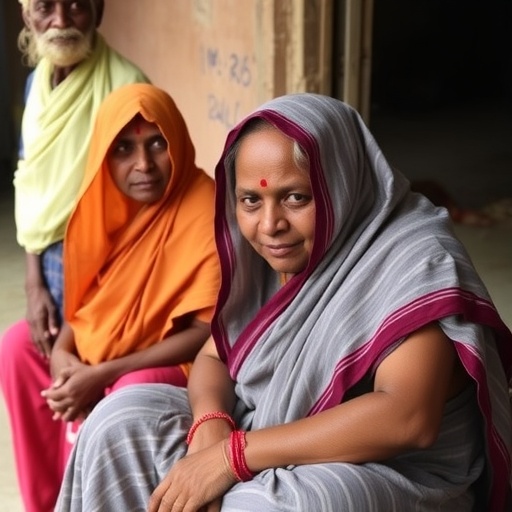Caste disparities in access to institutional credit present a critical obstacle to sustainable development, particularly in rural India. Recent research conducted by Zeeshan, Khan, and Shamim sheds light on this pressing issue, revealing alarming discrepancies in how different caste groups interact with financial institutions. The study highlights that those from marginalized communities, often located in rural areas, struggle significantly more to secure financial resources compared to their higher-caste counterparts. This lack of access not only hampers individual economic prospects but also has broader implications for community development and agricultural productivity.
The study emphasizes that institutional credit is crucial for empowering farmers and small entrepreneurs. It enables them to invest in agricultural inputs, technology, and even education, thereby increasing productivity and fostering economic growth. However, for many households belonging to scheduled castes and tribes, the pathway to credit is fraught with barriers, including social stigma, lack of documentation, and systemic biases within financial institutions. The researchers conducted a thorough analysis, employing a mixed-method approach that included both qualitative interviews and quantitative data analysis, to illustrate these disparities comprehensively.
A critical aspect of the research centers around the historical context of caste in India. The entrenched caste system, with its age-old hierarchies, permeates various societal facets, including access to resources. The findings reveal that financial institutions often reflect these societal biases, perpetuating a cycle of poverty and marginalization among lower castes. As the study notes, the persistent income disparities between castes can be traced back generations, creating a robust framework of disadvantage that is difficult to dismantle.
In examining institutional responses, the researchers highlight the need for policies that actively promote inclusivity within the financial sector. They suggest that banks and microfinance institutions must not only broaden their outreach but also revise their credit assessment criteria to be more flexible and reflective of the socio-economic realities faced by marginalized groups. Training programs aimed at both financial service providers and potential borrowers could bridge gaps in understanding and availability.
The implications for sustainable development are significant. Access to credit is directly correlated with the ability of rural communities to adopt sustainable practices, invest in renewable energy, and enhance resilience against climate change impacts. Without equitable access to credit, the push for sustainability in rural development could stall, countering national and global efforts to achieve the United Nations Sustainable Development Goals. Thus, addressing caste-based financial disparities emerges not just as a social justice issue, but as a vital component of environmental stewardship.
Furthermore, the research posits that empowering lower caste groups financially can spur innovation and diversification within rural economies. It fosters entrepreneurship and encourages new generations to explore agricultural diversification beyond traditional cropping systems which can improve food security. Inclusive financial systems can lead to empowered communities that are better equipped to advocate for their rights and work towards improving their living conditions.
As the research suggests, enhancing credit access must also involve community-driven initiatives that raise awareness about financial literacy. Many individuals from lower castes may be unaware of their rights or the existence of programs specifically designed to aid them. Educational outreach initiatives, coupled with a streamlined application process for credit, could significantly increase financial inclusion among these groups.
The urgency of reforms is underscored by the ongoing economic challenges in rural India. With rising unemployment and the aftershocks of the pandemic still being felt, the need for accessible financial services has never been more pronounced. By addressing caste-based disparities within this crucial arena, policymakers can transform the economic landscape, fostering environments where all individuals, regardless of their caste, have equal access to the support they need to thrive.
Moreover, the study calls for a collaborative approach involving government agencies, non-governmental organizations (NGOs), and financial institutions. This coalition could work towards creating frameworks that hold financial entities accountable for discriminatory practices and advocate for transparency in the lending process. Ensuring equitable treatment within financial systems lays the foundation for long-term sustainable practices.
The findings of the research present a clarion call for urgent reforms in the financial sector. While governmental policies to address caste disparities have made strides, there remains significant work to be done within financial institutions to ensure that access to credit reflects inclusivity. As rural economies teeter on the brink of either sustainable development or stagnation, the time to act is now.
In conclusion, the research conducted by Zeeshan, Khan, and Shamim not only highlights the caste disparities present in institutional credit access but also underscores the multifaceted implications for sustainable development in rural India. To move toward a more equitable future, it is essential to dismantle these barriers, empowering marginalized communities to break free from the cycles of poverty and disenfranchisement. Only through collective effort and commitment to inclusivity can the true potential of rural India be realized, paving the way toward sustainable development.
By placing emphasis on equitable access to institutional credit as a fundamental pillar of rural development, the authors provide an insightful analysis critical to the global conversation on social equity. In a nation where caste continues to dictate access to resources, the commitment to providing equal opportunity through credit access stands as a testament to our shared responsibility for sustainable futures.
Subject of Research: Caste disparities in institutional credit access and sustainable development in rural India.
Article Title: Caste disparities in institutional credit access and their implications for sustainable development in rural India.
Article References:
Zeeshan, Khan, M.A., Shamim, T. et al. Caste disparities in institutional credit access and their implications for sustainable development in rural India.
Discov Sustain 6, 1137 (2025). https://doi.org/10.1007/s43621-025-01805-6
Image Credits: AI Generated
DOI: 10.1007/s43621-025-01805-6
Keywords: Caste disparities, institutional credit, sustainable development, rural India, financial inclusion, economic empowerment.




